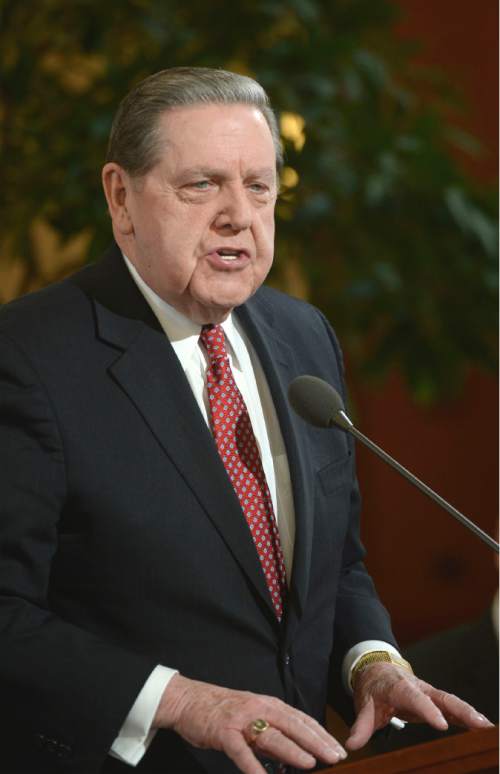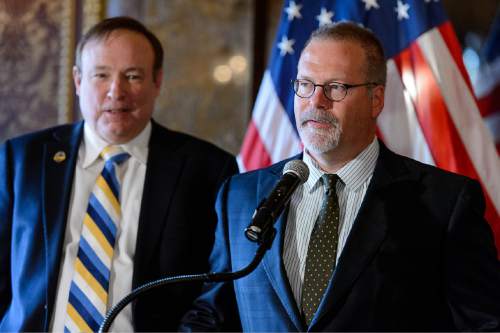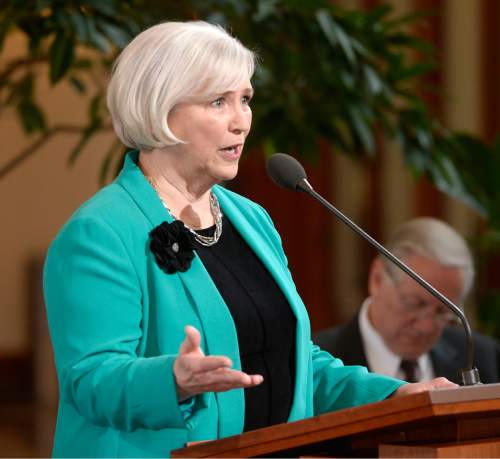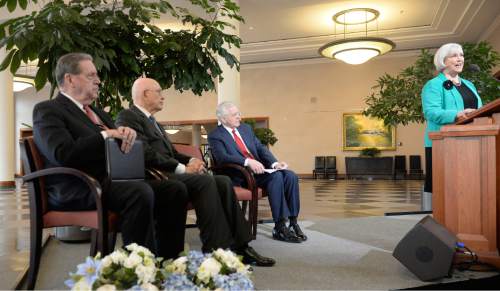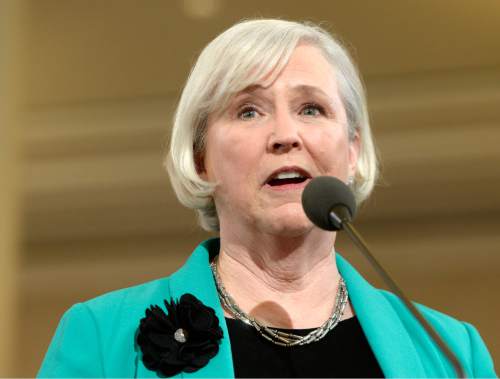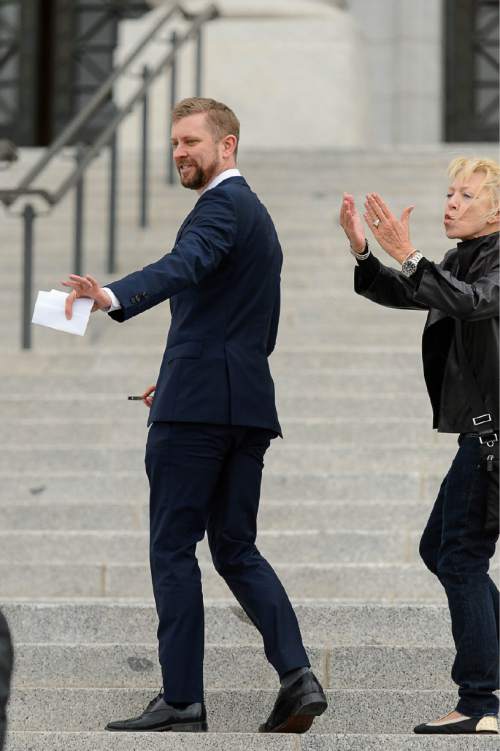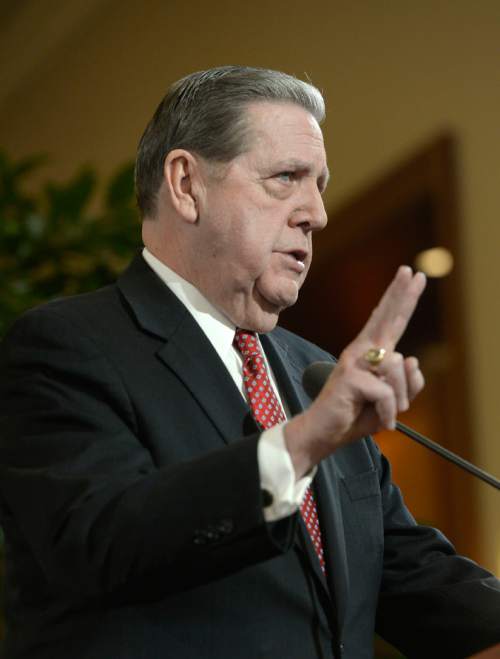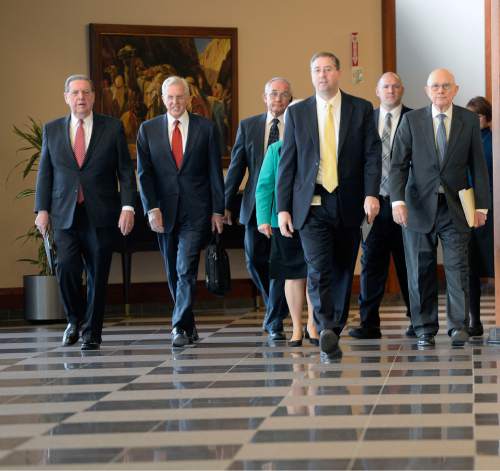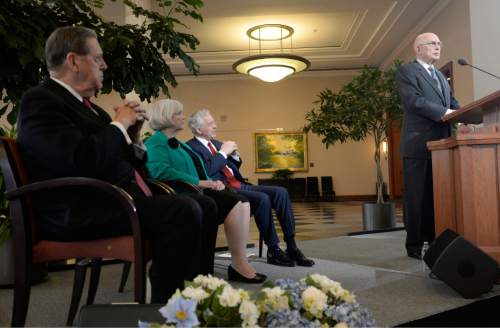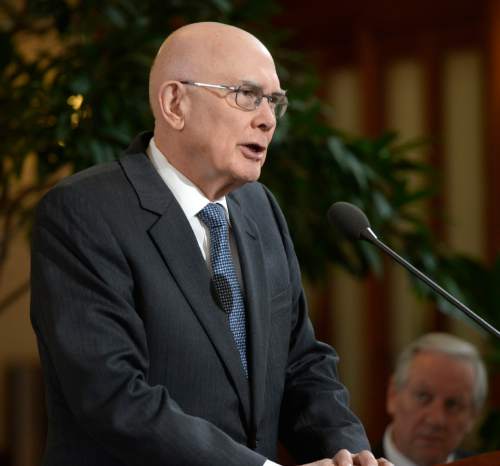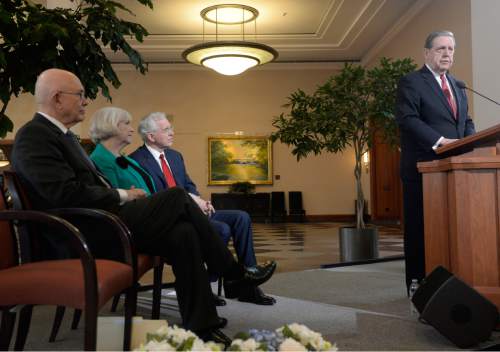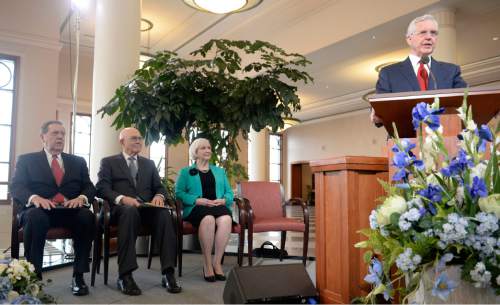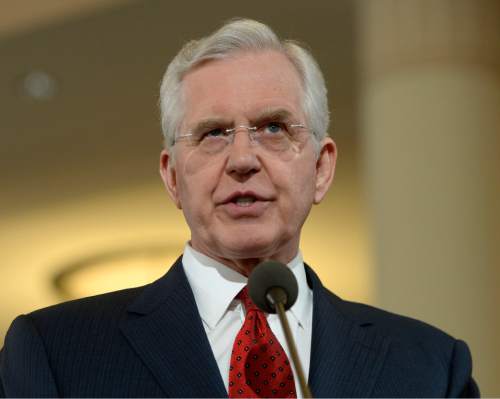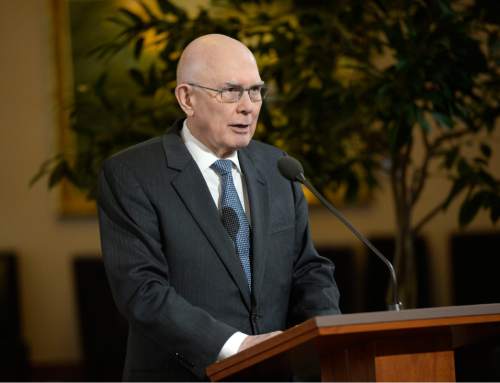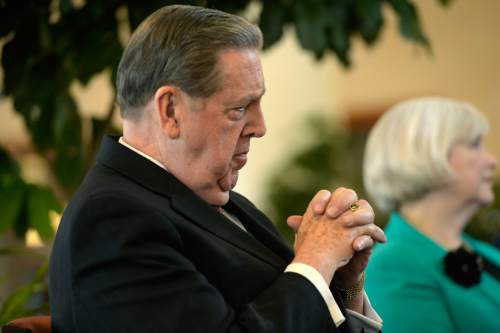This is an archived article that was published on sltrib.com in 2015, and information in the article may be outdated. It is provided only for personal research purposes and may not be reprinted.
Top leaders of The Church of Jesus Christ of Latter-day Saints called Tuesday for passage of laws granting statewide protections against housing and employment discrimination for gay and lesbian Utahns — as long as those measures safeguard religious freedom.
The move, one LGBT advocates have been pushing for years, provides a major boost for the prospects of nondiscrimination statutes on Utah's Capitol Hill. Such proposals have been bottled up in the Legislature for years — despite the church's historic endorsement of similar protections in Salt Lake City ordinances in 2009.
Utah's predominant faith issued the plea for such measures at all levels of government during a rare news conference, featuring three apostles — Elders Jeffrey R. Holland, Dallin H. Oaks and D. Todd Christofferson — and a high-profile women's leader, Neill Marriott, second counselor in the church's Young Women general presidency.
"We call on local, state and the federal government," Oaks said in a news release, "to serve all of their people by passing legislation that protects vital religious freedoms for individuals, families, churches and other faith groups while also protecting the rights of our LGBT citizens in such areas as housing, employment and public accommodation in hotels, restaurants and transportation — protections which are not available in many parts of the country."
Mormon officials "believe laws ought to be framed to achieve a balance," Oaks said, "in protecting the freedoms of all people, while respecting those with differing values."
The LDS Church preaches that sexual relations — other than those between a legally married man and woman — run contrary to the laws of God and thus opposes same-sex marriage.
In 2009, the LDS Church endorsed two Salt Lake City ordinances barring housing and job discrimination based on sexual orientation or gender identity. It marked the first time the faith endorsed specific, pro-gay-rights legislation.
The Salt Lake City Council unanimously approved those measures, which carried some religious exemptions. A number of local governments — including Salt Lake County, Summit County, West Valley City, Ogden, Park City and Moab — adopted similar nondiscrimination ordinances without explicit backing from the LDS Church.
Nearly 20 Utah cities and counties have passed nondiscrimination ordinances, according to Equality Utah, which has advocated for the laws. But efforts to codify those protections statewide have come up short.
Sen. Steve Urquhart, sponsor of the SB100 nondiscrimination measure that he introduced Tuesday, expects that to change with the LDS Church's announcement
"I think the bill now passes," said the St. George Republican, even though the apostles did not mention his bill. "It was an endorsement of nondiscrimination legislation in employment and housing. There's one bill involving that."
Rep. Jacob Anderegg, R-Lehi, who is sponsoring legislation to protect religious individuals' ability to refuse to marry same-sex couples, is not so sure that passage is a sure bet.
"I still think House leadership is going to weigh the church's announcement and make a decision in the best interest of the Senate, the House and all of Utah," he said. "It certainly is an argument for moving [the religious-liberty bills] forward, and it removes any question of whether the church would stand in the way or remain silent."
Oaks stated the LDS Church is not backing any particular bill and has no plans to testify for or against measures on these issues.
"We are not promoting a specific legislative program," he said. "We are promoting the general principle of balance and fairness that we think should apply in the current contention about nondiscrimination and religious freedom."
In 2012 and 2013, versions of Urquhart's anti-discrimination bill made it through a Senate committee, but never got an up-or-down vote in the Senate. Last year, legislative leaders agreed not to hear any legislation dealing with LGBT issues, fearing such debate could hurt Utah's defense of its constitutional ban on same-sex marriage, which had been ruled unconstitutional by a federal judge and was on appeal.
The refusal to hear the bill was met with vocal and silent protests — as backers taped notes to the doors of the Senate chamber pleading for a hearing for the bill, and LGBT activists were arrested for blockading a Senate hearing.
Ultimately, the U.S. Supreme Court opted not to hear any of the cases where same-sex-marriage bans were deemed unconstitutional, allowing such unions to proceed in Utah and elsewhere. Since then, the high court has agreed to hear a case out of the 6th Circuit.
Until now, the LDS Church had largely been on the sidelines of the debate over discrimination protection — notwithstanding its high-profile support of the Salt Lake City measures. There were concerns, in particular, about how such a law might require same-sex couples to share student housing at church-owned Brigham Young University.
Urquhart said those concerns have been thoroughly addressed, and BYU housing is protected.
"I assume the church is talking about the very important protections of the First Amendment and anything we can do to codify First Amendment protections, that's always a good idea," he said. "I think it was a balance of protection and was a significant step forward for the LDS Church, LGBT individuals, the LGBT community and the entire state."
Oaks acknowledged that many state legislatures are considering laws relating to LGBT issues of discrimination and the church "is on record as favoring such measures."
At the same time, the apostle decried what he described as "the steady erosion of treasured [religious] freedoms that are guaranteed in the United States Constitution."
For evidence, the Mormon apostle noted California schools' refusal to recognize Christian student groups simply because those organizations require their own leaders to be Christian, and government lawyers subpoenaing the sermons and notes of pastors who opposed parts of a new law on religious grounds.
Oaks also pointed to 1984 gold medalist Peter Vidmar, a Mormon gymnast who resigned as symbolic head of the 2012 U.S. Olympic team for the London Summer Games after drawing fire for his support of California's Proposition 8 and his opposition to same-sex marriage. In addition, a CEO at Mozilla stepped down from the high-tech firm after his contribution to Prop 8 created an Internet uproar.
"When religious people are publicly intimidated, retaliated against, forced from employment or made to suffer personal loss because they have raised their voice in the public square, donated to a cause or participated in an election, our democracy is the loser," said Oaks, a former Utah Supreme Court justice. "Such tactics are every bit as wrong as denying access to employment, housing or public services because of race or gender."
Holland, who joined Oaks at the Conference Center briefing in downtown Salt Lake City, said religious organizations should have the right to "use church properties in accordance with their beliefs without second-guessing from government."
Faith groups should be allowed to set their own rules for "employment, honor code standards and accreditation as church schools," he said, and "church-owned businesses or entities that are directly related to the purposes and functions of the church must have the same latitude."
In addition to the anti-discrimination measure pending in the Utah Legislature, there is a bill and a constitutional amendment aimed at protecting religious liberties — giving legal protection to individuals who refuse to perform marriages or provide services based on their faith.
The question, Marriott said in her remarks, is "how to affirm rights for some without taking away the rights of others."
The push for gay rights was prompted by "centuries of ridicule, persecution and even violence against homosexuals," she said. "Ultimately, most of society recognized that such treatment was simply wrong, and that such basic human rights as securing a place to live should not depend on a person's sexual orientation."
As a matter of doctrine, the LDS Church does not support same-sex marriage, Marriott said. "But God is loving and merciful. His heart reaches out to all of his children equally, and he expects us to treat each other with love and fairness."
Above all, the LDS leaders said, the debate about balancing religious and gay rights — often a polarizing predicament — should be civil and respectful.
"Nothing is achieved," Holland said, "if either side resorts to bullying, political point scoring or accusations of bigotry."
Compromises, no doubt, will be required.
"Neither side may get all that they want," the LDS Church said in its news release. "We must all learn to live with others who do not share the same beliefs or values."
Mormon LGBT advocates rejoiced over Tuesday's news.
"To have the church stand in support of legislative protection for LGBT individuals is meaningful because it encourages Mormons to think differently about how we understand our LGBT brothers and sisters as our equals under the law," said Mitch Mayne, board member of Mormons for Equality. "To some, this will be new thinking, and that's a good thing. To many others, it will be permission to speak out about what they've known and felt in their hearts all along: that LGBT individuals are just as valued and important in the eyes of our Savior as any heterosexual person."
Troy Williams, executive director of Equality Utah, said Mormons and LGBT Utahns need not be divided on these issues.
"Gay and transgender Utahns can live and work beside people of faith," he said. "Many within the LGBT community are themselves people of faith."
Not all commentators were as welcoming.
Andrew Rosenthal, editorial page editor for The New York Times, wrote in a blog post that LDS leaders are seeking "legal permission to use their religion as an excuse to discriminate."


